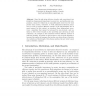27 search results - page 2 / 6 » Oblivious Transfer with a Memory-Bounded Receiver |
105
Voted
EUROCRYPT
2007
Springer
15 years 6 months ago
2007
Springer
We study an adaptive variant of oblivious transfer in which a sender has N messages, of which a receiver can adaptively choose to receive k one-after-the-other, in such a way that ...
108
click to vote
STOC
1999
ACM
15 years 5 months ago
1999
ACM
Oblivious polynomial evaluation is a protocol involving two parties, a sender whose input is a polynomial P, and a receiver whose input is a value α. At the end of the protocol t...
126
click to vote
CRYPTO
2005
Springer
15 years 6 months ago
2005
Springer
Since bit and string oblivious transfer and commitment, two primitives of paramount importance in secure two- and multi-party computation, cannot be realized in an unconditionally ...
127
click to vote
JOC
2007
15 years 16 days ago
2007
This paper is about the Oblivious Transfer in the distributed model proposed by M. Naor and B. Pinkas. In this setting a Sender has n secrets and a Receiver is interested in one o...
73
Voted
CRYPTO
2006
Springer
15 years 4 months ago
2006
Springer
Abstract. We study unconditionally secure 1-out-of-2 Oblivious Transfer (1-2 OT). We first point out that a standard security requirement for 1-2 OT of bits, namely that the receiv...

